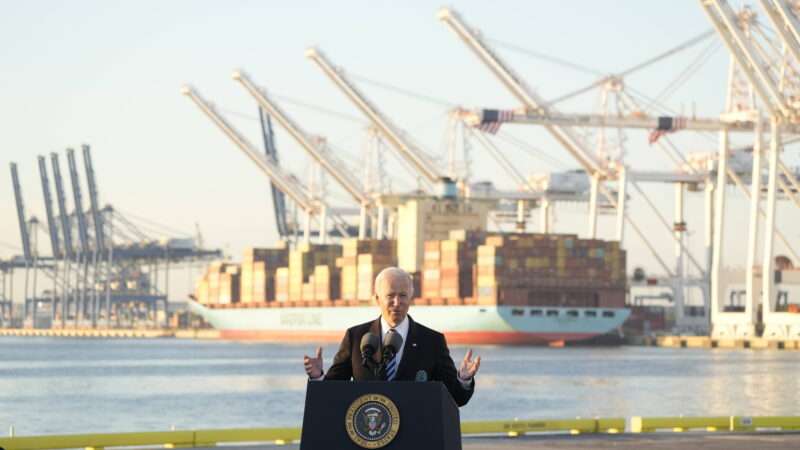
When he was campaigning four years ago, Joe Biden offered voters an alternative to the flawed protectionism and expensive tariffs of the Trump administration. "We're going after China in the wrong way," he said at one point during that successful run at the White House. On other occasions, he (correctly) highlighted how Americans were bearing the brunt of then-President Donald Trump's tariffs, a sentiment that reflected his long history of pro-trade views.
With the prospect of a rematch against Trump looming in November, the Biden administration announced Tuesday that voters won't be getting that choice this time around.
After days of speculation and leaks, the White House officially ordered massive new tariffs against Chinese-made electric vehicles (E.V.s), semiconductors, port equipment, and medical gear, including syringes and rubber gloves. In other words, Biden is now actively pursuing an agenda that he once termed "the wrong way" to counter China.
The White House announced Tuesday that it would double existing tariffs on semiconductors from 25 percent to 50 percent, hike tariffs on steel and aluminum, and increase tariffs on many components used to build E.V. batteries from 7.5 percent to 25 percent. The big blow is the stunning tariff hike on E.V.s imported from China, which will now be subject to a 100 percent tariff, up from 25 percent.
Only about 1 percent of American E.V. imports come from China right now, but the high tariffs will effectively guarantee that Americans cannot purchase cars from some of the world's biggest E.V. manufacturers in the future.
It is a decision that reflects the muddled economic thinking that has defined Biden's time in office. It is a promise to raise taxes on Americans who want to purchase products the president disfavors, one that cuts directly against the same president's own environmental goals, all wrapped up inside silly election-year rhetoric.
"Today's announcement reflects President Biden's commitment to always have the back of American workers," the White House said in a statement.
But once those workers clock out and become consumers, things might look a bit different. As I've written before, both Trump and Biden err when they propose policies that benefit workers at the expense of everyone else. The economy is not made up of workers and consumers competing against one another but of individuals who are sometimes workers and sometimes consumers. The zero-sum logic behind economic protectionism makes everyone poorer even as the politicians promise otherwise.
And we know how tariffs work—or, rather, don't work. Indeed, we've had a six-year-long experiment in exactly this phenomenon.
"Tariffs on Chinese EVs won't just make Chinese EVs more expensive, they will also make American EVs more expensive," Ryan Young, a senior economist with the Competitive Enterprise Institute, said in a statement. "This is because domestic producers can now raise their prices without fear of being undercut by competitors. Good for them but bad for consumers—and for the Biden administration's policy goal of increased EV adoption."
Young pointed to the fact that domestic steel prices rose after Trump slapped tariffs on imported steel. Higher steel prices affected consumers in a variety of indirect ways, like by raising the price of cars and other products made from steel.
Erica York, a senior economist at the Tax Foundation, tells Reason that the new tariffs "will work no differently under President Biden than they did under former President Trump; they'll raise costs for consumers and businesses, and in this case, those higher costs will work in direct opposition to Biden's goal of greater EV adoption."
After the 2020 election, the incoming Biden administration's talk of a thorough review of Trump-era tariffs never amounted to much, and the White House has kept most of Trump's tariffs in place despite a lack of evidence that they are accomplishing anything other than raising prices for American businesses and consumers. Even though Biden has governed as a protectionist president, Tuesday's decision illustrates the extent to which cynical politics have triumphed over serious economics in Washington today—even after several years of higher-than-normal inflation have made Americans particularly aware of price hikes.
In that environment, adding more tariffs "is remarkably tone-deaf," says Bryan Riley, director of the free trade initiative at the National Taxpayers Union Foundation. "There is near-universal agreement that Section 301 tariffs failed to achieve their goals while costing U.S. taxpayers the equivalent of $1,700 per household and sparking Chinese retaliation against U.S. farmers and other exporters. It is asinine for the Biden administration to double down on this failed policy."
When voters go to the polls this November, they will face a choice between two men who have used their presidential powers to hike import taxes on American businesses and consumers (one of whom is campaigning on a promise to use tariffs even more aggressively in the future). Now would be a good time for Congress to claw back some of the trade policy power it has delegated to an increasingly irrational executive branch.
The post Biden's Tariffs Are a Bad Idea appeared first on Reason.com.







